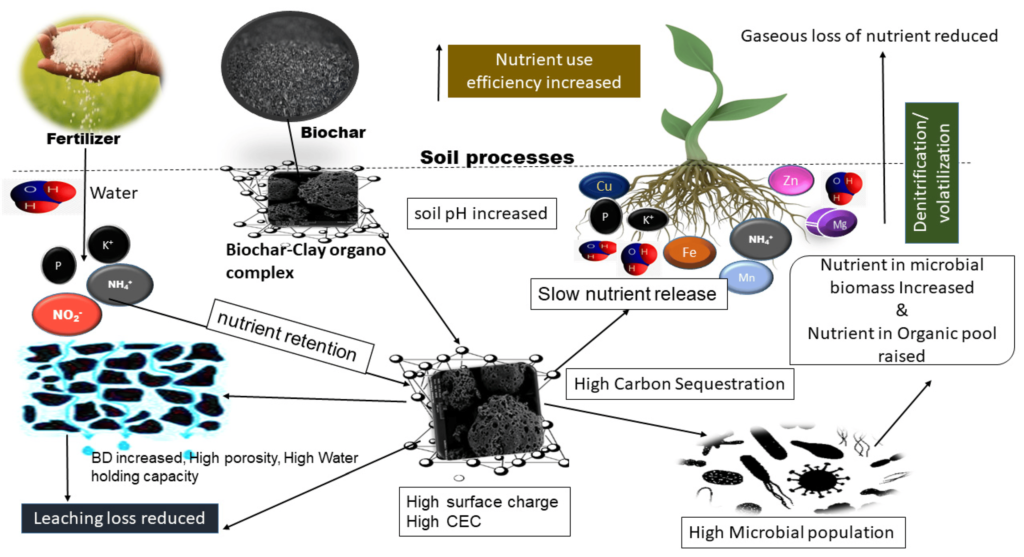
Biochar reveals a multifaceted and promising solution to address various environmental, social, and economic challenges. Realising its full potential requires an integrated approach, combining scientific research, policy development, market innovation, community engagement, and education. By addressing these interconnected dimensions, biochar can contribute to building a more sustainable, resilient, and inclusive world, helping to mitigate climate change, enhance ecosystem health, and improve livelihoods.
Carbon Sequestration Mechanism:
The ability of biochar to sequester carbon effectively lies in its high porosity and stable aromatic carbon structure. This structure is created during the pyrolysis process when organic matter is heated in the absence of oxygen, allowing for the transformation of volatile organic compounds into non-volatile, stable carbon structures. This stability mitigates the rate of oxidation and microbial decomposition, thus locking the carbon in a solid state and preventing it from being released as CO2.
Soil Microbial Activity and Ecosystem Health:
The addition of biochar to soil can significantly enhance soil microbial activity by providing refuge and habitat for microorganisms, thereby enhancing soil microbial diversity and abundance. This improved microbial activity can facilitate nutrient cycling, promote plant growth, and increase resilience against pests and diseases, collectively contributing to the overall health and productivity of ecosystems.
Sustainability and Ethical Considerations:
In the quest for sustainable biochar production, it is pivotal to ensure the responsible sourcing of biomass. Utilising agricultural residues and waste biomass can avoid deforestation and land-use change, mitigating potential negative environmental impacts. Moreover, engaging local communities in the production and use of biochar can foster social inclusivity and equitable economic development, preventing exploitation and ensuring shared benefits.
Economic Viability and Market Dynamics:
To foster biochar’s adoption, it is critical to establish its economic viability. This involves the optimisation of production processes, the development of value-added products, and the establishment of market mechanisms that can offer competitive pricing and ensure a return on investment for producers. It is also crucial to understand market drivers, supply and demand dynamics, and potential barriers to entry, to navigate the evolving biochar market effectively.
Policy Frameworks and Regulations:
Developing clear and comprehensive policy frameworks is crucial to guiding the sustainable development of the biochar industry. This involves setting standards for biochar quality, production processes, and application rates, ensuring consistency and reliability across the sector. Effective regulations can also incentivise research and innovation, foster investments, and facilitate the integration of biochar into carbon markets, contributing to climate change mitigation efforts.
In-depth Research and Development:
Continued research is crucial to exploring the diverse applications of biochar, from soil amendment to waste treatment and water purification. Investigating the interactions between biochar and different soil types, climatic conditions, and plant species can optimise its efficacy and adaptability. Moreover, studying the long-term impacts of biochar on soil properties, carbon dynamics, and ecosystem functions is essential to assess its sustainability and resilience over time.
Education and Capacity Building:
Creating awareness and building capacity among stakeholders, including farmers, policymakers, and consumers, is essential to promote the understanding and acceptance of biochar. Tailored educational programs, training sessions, and outreach initiatives can disseminate knowledge, enhance skills, and foster collaborations, facilitating the sustainable and responsible use of biochar across different sectors and regions.
Views: 8141
